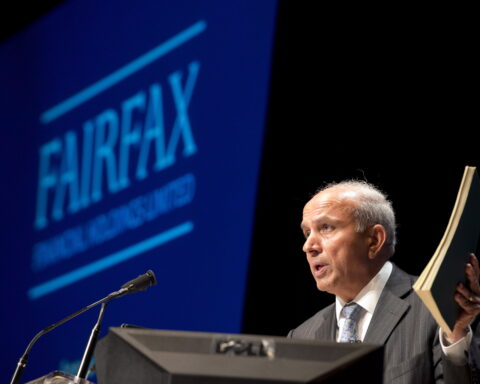Patrick DeRochie is senior manager for Shift Action for Pension Wealth and Planet Health, a charitable initiative that works to protect pensions and the climate by bringing together beneficiaries and their pension funds to engage on the climate crisis.
Come the first day of 2023, Canada’s federal government will essentially end financing for oil and gas internationally.
The policy is the fulfillment of a key 2021 election promise by the governing Liberals to align international public financial support for the clean energy transition. Yet while Canadians’ tax dollars will no longer go toward financing fossil fuels abroad, their hard-earned retirement savings still do. Canada’s largest pension funds, including the Canada Pension Plan Investment Board (CPPIB) and Public Sector Pension Investment Board (PSPIB), continue to finance oil and gas expansion abroad.
This inconsistency must be addressed. It underscores the need for greater climate-related regulation of the financial sector, including public pension plans.
In early December, Canada announced it would implement the Glasgow Statement, a multilateral commitment signed at last year’s COP26 to end international public financing for fossil fuels by the end of 2022 and fully prioritize the clean energy transition. Although the new Canadian policy contains some modest exceptions for fossil gas (aka natural gas), blue hydrogen and projects that use carbon capture, utilization and storage, it applies across all federal departments, agencies and Crown corporations. This makes it unlikely that Canada would finance any new fossil fuel project internationally in future. Minister of Environment and Climate Change Steven Guilbeault also suggested that domestic fossil fuel subsidies would be eliminated in the first half of 2023.
Canada’s new policy will predominantly affect Export Development Canada (EDC), a Crown corporation with a long history of funnelling billions in support to the oil and gas industry. Between 2016 and 2019, EDC provided an average of $10.6 billion per year in public financing for oil and gas, and another $13.6 billion in 2020. But while it cuts off the flow of international financing from EDC, Canada’s new commitment does not apply to other Crown financial institutions like CPPIB and PSPIB.
CPPIB is the investment manager for the $523-billion Canada Pension Plan, the national retirement fund for more than 21 million Canadians outside of Quebec. PSPIB is the $230-billion investment manager for more than 900,000 federal public servants. Both pension managers are significantly invested in fossil fuels in Canada and abroad and have no exclusion policy for oil, gas and coal.
The International Energy Agency has been unambiguous that limiting global heating to 1.5℃ requires no new investment in fossil fuels. The UN High-Level Expert Group on the Net-Zero Emissions Commitments of Non-State Entities was unequivocal at COP27 in Egypt, where it said that credible climate plans from financial institutions mean “no room for new investment in fossil fuel supply and a need to decommission existing assets.” And now Canada’s federal government is making good on its promise to end public financing of fossil fuels abroad.
But that expert advice is not being followed by Canada’s federal pension managers. So far, their climate strategies fall short of credible climate plans that align their portfolios with a safe climate future.
PSPIB released its inaugural climate strategy in April 2022, recognizing the urgency of limiting global heating to 1.5℃ and committing to support the global transition to net-zero. But just a month later, a private utility company co-owned by PSPIB spent more than $1 billion to buy 5,835 kilometres of fossil gas pipelines and a gas storage facility in Alaska.
CPPIB is also a major investor in fossil fuels, both in Canada and internationally. Although Canada’s national pension manager is making huge investments in renewable energy, has committed to net-zero emissions by 2050, and calls “the need to combat planetary warming urgent and clear,” CPPIB regularly and publicly states its intention to continue investing in fossil fuels. And the actions of the numerous private oil and gas companies owned by CPPIB demonstrate that this Crown corporation plans to continue financing fossil fuel expansion.
For example, CPPIB-owned Civitas Resources, which calls itself “Colorado’s largest pure play oil and natural gas producer” plans to drill hundreds of new wells in 2023. In August, Nephin Energy – Ireland’s largest gas producer, which is 43.5% owned by CPPIB – announced it is studying options to prolong the life of the Corrib gas field off the coast of Ireland and build two new gas plants. In 2022, CPPIB also invested in Kimmeridge Fund VI, a U.S.-based alternative asset manager whose investments include oil and gas producers in Colorado and Wyoming and an oil and gas royalty interests company in the Permian Basin in the southwestern U.S.
These investments in fossil fuel expansion by CPPIB clearly contradict Canada’s new policy.
CPPIB and PSPIB are independent from government – as they should be. But that does not let them off the hook for failing to align Canadian pension savings with climate safety. They have a fiduciary duty to assess and manage climate-related financial risks and invest in the best long-term interests of Canadians, including those who won’t retire until well into the second half of the 21st century. There can be no retirement security for pension plan members if the climate crisis spirals out of control.
CPPIB and PSPIB are now outliers, ignoring the warnings of scientists, economists, policy-makers – and now the actions of the federal government – to end their financing of the primary causes of the climate crisis. It’s time for them to stop using Canadians’ pension capital to finance fossil fuel expansion and to start developing credible plans to phase out their fossil fuel assets.
The failure of CPPIB, PSPIB and other Canadian financial institutions to do what’s necessary to prevent catastrophic climate change underscores the need for regulation to align the sector with Canada’s climate obligations. The federal government took an important step in ending international public financing of fossil fuels, an essential part of any credible climate plan. It’s time that all financial institutions, including our federal pension plans, do the same.







